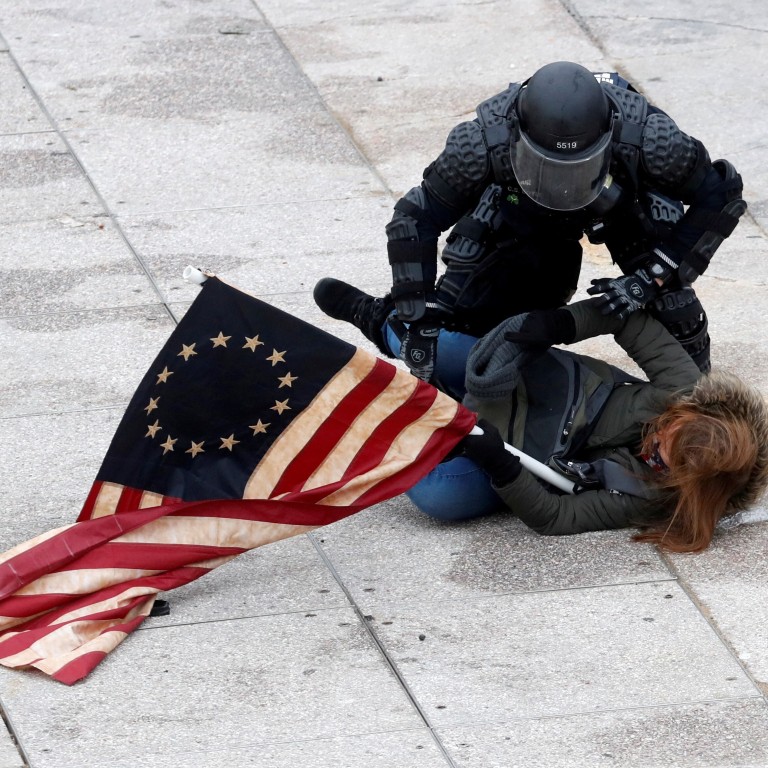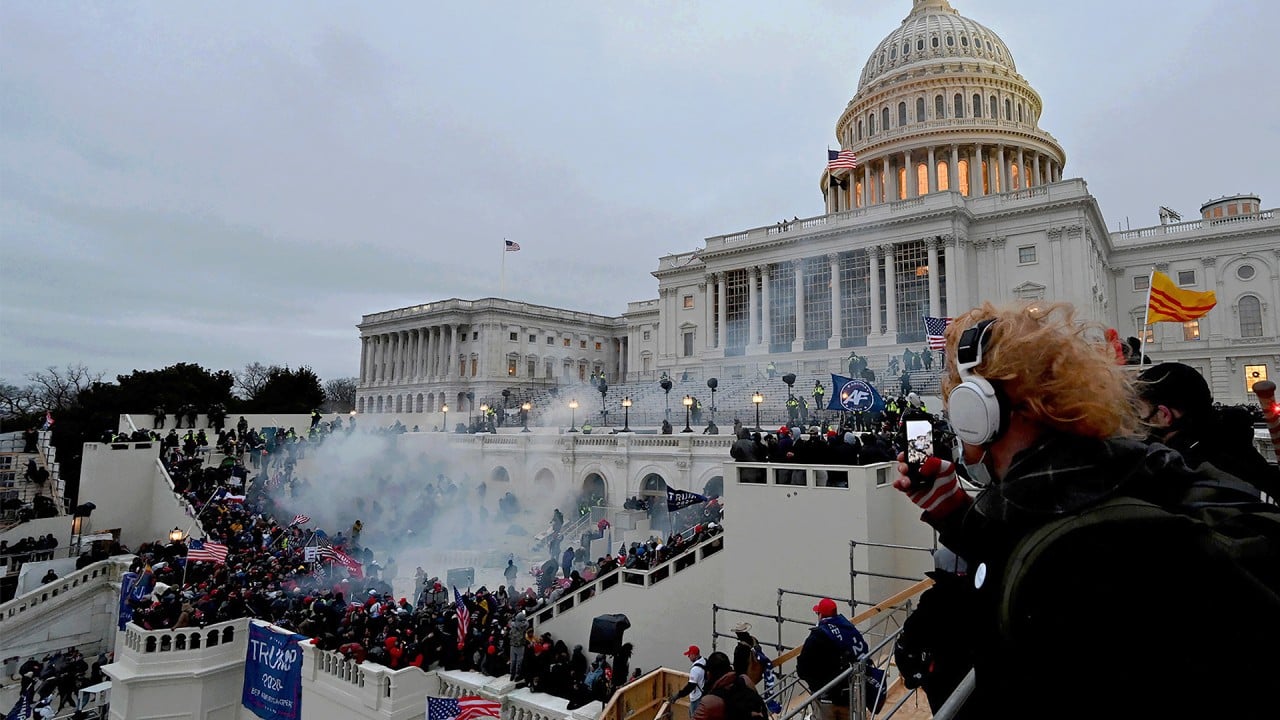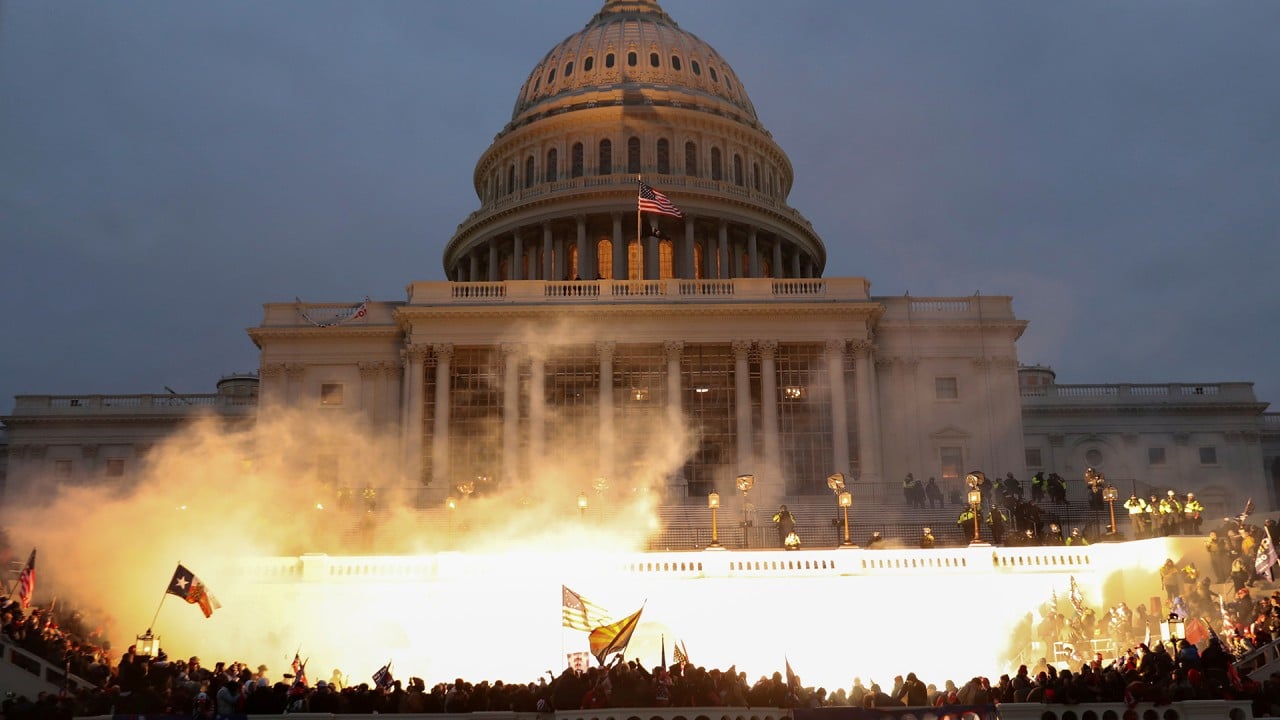
‘The Washington Spring’ or just a blip? How Asia saw the chaos of Trump supporters storming US Capitol
- In a region where US support for anti-government protesters in Thailand and Hong Kong rankles for some, there is a mixture of sadness and mockery
- Some say the scenes have turned the world’s most powerful country into a ‘laughing stock’; others say it shows a democracy that still needs to ‘mature’

05:52
Trump supporters storm US Capitol, interrupting Congress’ certification of Biden’s victory

While the chaos was not enough to prevent the certification of Biden’s victory, it was enough to give even Hong Kong’s pro-democracy activists pause for thought.
In addition to the four deaths, which included one woman shot in the chest, more than 50 people were arrested in connection with the siege, which was condemned even among America’s strongest allies in Asia, from Australia and New Zealand to Japan and India.
In pictures: Trump supporters storm the Capitol
“When individuals and groups decide to take the law into their own hands, it is essentially mob justice. We see this trial by public jury happening online and people may think there are no consequences. But it can make people angry and we now see this being translated into physical action,” he told This Week in Asia.

TURNING UGLY
The episode had started as a sparse gathering of Trump protesters waving flags and signs outside the Capitol building, seemingly answering Trump’s encouragement to a crowd of thousands at an earlier rally that they should “never concede” his election loss – despite him still having offered no evidence of the voter fraud he alleges.
The atmosphere grew increasingly ugly as the crowd swelled, numbering well into the thousands at one point. The most violent elements, some of whom had equipped themselves with riot gear, then spilled over, breaking down barricades, smashing windows, and storming the Capitol as the outnumbered police watched on largely helpless before reinforcements arrived and eventually quelled the violence.
Chong Ja Ian, associate professor of political science at the National University of Singapore, said that the scenes in the US were on a different level to protesters’ storming of Hong Kong’s Legislative Council in 2019.
“That the individuals trying to occupy the US Capitol did so threatening physical violence and coercion towards people sets this apart from ... other recent political occupation attempts,” he said.
In Taiwan, where the 2014 Sunflower Movement also involved the occupation of the national legislature, Ho Ming-sho, professor at the department of sociology at National Taiwan University, said politicians had not commented on the incident despite “substantial Trump supporters in Taiwan due to his tough gestures toward China”. He said the Taiwanese understood what happened in Washington was “incited by a sitting president, involved violence, and it challenged the integrity of democratic institutions and elections”, whereas Taiwan’s was not violent, was led by students and citizens and was in protest against lawmakers’ breaches. “Many ex-Sunflower Movement [leaders] today denounced the US Capitol incident and rejected the [comparisons],” he said.

03:15
World shocked by assault on the US Capitol by radical pro-Trump supporters in Washington
“The president’s actions threaten American democracy … He should be removed from office immediately before further violence takes place or further damage is done to our democracy,” read the letter, signed by more than 200 political scientists.
Indeed, for some the scenes were almost to be expected as a presidency that detractors say has done more than any other in memory to tarnish the country’s reputation reaches its final desperate throes.
Biden’s election victory certified after chaos at US Capitol leaves four people dead
It was an assault on democracy and democratic institutions by those who refused to relinquish power peacefully as required by law, he said.
Jean Hong, an associate professor of social science at the Hong Kong University of Science and Technology, said while there had been violent protests in the US for months, the storming of the Capitol had a “ineffably large” symbolic meaning and she had been left “utterly shocked”.
One danger was that the episode could give a propaganda victory tto authoritarian leaders. Ho from the National Taiwan University, said there was now “ample material for dictators to lecture on the evils of democracy”.
Chong added: “Authoritarians, including across Asia, will try to use the attempted takeover to show how the US is craven and in no position to exercise any leadership. They will use the event to argue against loosening their grip on authority and make a claim for why they should not be subject to scrutiny.”
JUST A BLIP?
Shocking though the scenes undoubtedly were, many clung to the hope that the incoming Biden administration could work to reverse the damage, saying it remained to be seen what lasting effect the scenes would have on America’s international standing.
Hong said the violence “might be the last outcry from a populist mob as the end of the Trump administration nears”.
She said healing the wounds would not be Biden’s task alone; the Republicans too would have to work to strengthen democratic institutions. “This may have already begun. We see immediate and almost unified reactions from the Republican representatives condemning the breach today,” she added.
While the protests were “a disgrace to the American constitution”, June Park, a political scientist at George Washington University’s East Asia National Resource Center, said that perhaps they represented “growing pains for the American democracy to mature”.
“The general optics are that Donald Trump still has not conceded and thus the transition to the Biden administration is not so smooth. This is another bump along that process,” she said.
Park said the Biden administration was likely to work hard on America’s image abroad, and “Americans must pull through this incident so that lessons are learned and such incidents are not repeated again”.
Park said it would be an exaggeration to say this one incident alone diminished America’s standing in the world – or even in Asia. Rather than a reflection on the country, the scenes were a story chiefly about one man.
“The Trump presidency itself has diminished – or tarnished – America’s standing in the world,” she said.


